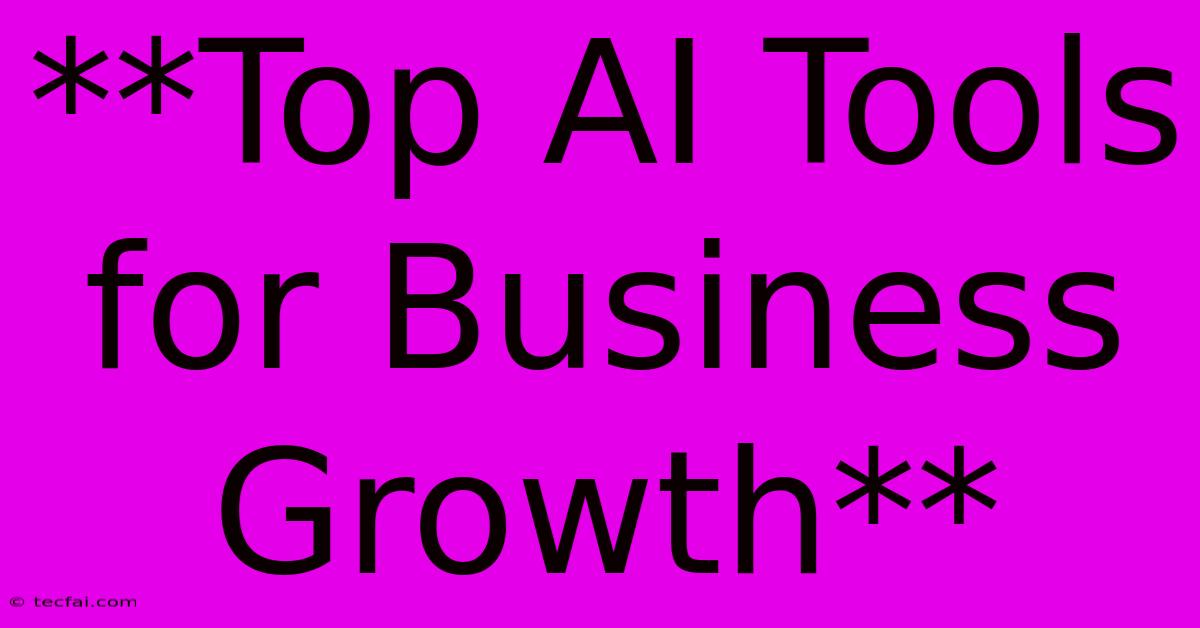**Top AI Tools For Business Growth**

Discover more detailed and exciting information on our website. Click the link below to start your adventure: Visit Best Website tecfai.com. Don't miss out!
Table of Contents
Top AI Tools for Business Growth: Unleashing the Power of Automation and Intelligence
In today's fast-paced business landscape, staying ahead of the competition requires embracing innovation and leveraging the power of technology. Artificial Intelligence (AI) is no longer a futuristic concept; it's a reality that's transforming businesses across industries. AI tools offer businesses a powerful arsenal to streamline operations, boost productivity, and ultimately drive growth.
But with so many AI tools available, choosing the right ones for your specific needs can be daunting. This article will explore some of the top AI tools for business growth categorized by function, highlighting their capabilities and benefits:
1. AI for Marketing and Sales
a) Marketing Automation:
- HubSpot: This comprehensive marketing automation platform leverages AI to personalize customer journeys, optimize email marketing campaigns, and analyze website performance.
- Marketo: Marketo's AI-powered features help automate lead nurturing, personalize content, and predict customer behavior for targeted marketing efforts.
- Pardot: A powerful Salesforce-integrated platform, Pardot uses AI for lead scoring, campaign optimization, and marketing analytics.
b) Sales Intelligence:
- Salesforce Einstein: Built into Salesforce CRM, Einstein leverages AI to predict sales opportunities, analyze customer data, and personalize interactions.
- Gong: This AI-powered tool analyzes sales calls and meetings, providing insights into customer behavior and best practices for effective selling.
- ZoomInfo: ZoomInfo utilizes AI to provide detailed information on leads, including contact data, company insights, and market trends.
2. AI for Operations and Productivity
a) Customer Service and Support:
- Zendesk: Zendesk's AI-powered chatbot can answer customer inquiries, resolve simple issues, and provide self-service options, freeing up human agents for complex tasks.
- Intercom: Intercom offers a conversational chatbot that engages visitors on websites, answers questions, and provides personalized support.
- Drift: Drift uses AI to qualify leads, engage prospects, and provide instant support through chatbots and personalized messaging.
b) Project Management and Task Automation:
- Asana: Asana utilizes AI to recommend deadlines, identify potential bottlenecks, and suggest task assignments for improved project planning and management.
- Monday.com: Monday.com offers AI-powered automation features for task delegation, deadline tracking, and project progress reporting.
- Zapier: While not AI-driven, Zapier seamlessly connects various apps and automates repetitive tasks, significantly boosting productivity.
3. AI for Finance and Data Analytics
a) Financial Forecasting and Analysis:
- Oracle NetSuite: Oracle NetSuite provides AI-powered financial forecasting, budgeting, and expense management tools for better financial planning.
- Sage Intacct: Sage Intacct integrates AI for automated expense tracking, invoice processing, and real-time financial reporting.
- Xero: Xero's AI-powered features streamline accounting tasks like invoice reconciliation, expense tracking, and financial analysis.
b) Data Analytics and Insights:
- Google Analytics: Google Analytics incorporates AI to analyze website traffic, identify user behavior patterns, and generate actionable insights for improved marketing strategies.
- Tableau: Tableau's AI capabilities help visualize data, identify trends, and create interactive dashboards for easier data interpretation.
- Power BI: Power BI integrates AI for data exploration, predictive modeling, and creating interactive reports to uncover valuable business insights.
Choosing the Right AI Tools
Selecting the right AI tools for your business depends on your specific needs and objectives.
Here are some key considerations:
- Industry: Different industries have unique challenges and opportunities.
- Business Size: Smaller businesses may require simpler, more affordable tools.
- Budget: AI tools vary in pricing, from free options to expensive enterprise solutions.
- Technical Expertise: Some tools require technical knowledge, while others are user-friendly.
The Future of AI in Business
The adoption of AI tools is rapidly increasing, with its transformative potential only beginning to be realized. As AI continues to evolve, businesses that leverage this technology will gain a competitive advantage.
By embracing AI, companies can:
- Improve Efficiency and Productivity: Automate tasks, reduce errors, and free up time for strategic initiatives.
- Enhance Customer Experience: Provide personalized experiences, faster response times, and 24/7 support.
- Gain Deeper Insights: Analyze data, identify patterns, and make informed business decisions.
- Stay Ahead of the Curve: Leverage the latest technology to innovate and gain a competitive edge.
The future of business is undoubtedly intertwined with AI. By strategically integrating the right AI tools, companies can unlock unprecedented growth opportunities and thrive in the digital age.

Thank you for visiting our website wich cover about **Top AI Tools For Business Growth**. We hope the information provided has been useful to you. Feel free to contact us if you have any questions or need further assistance. See you next time and dont miss to bookmark.
Featured Posts
-
Wolverhampton Leisure Center New Darting Arena Almost Ready
Nov 10, 2024
-
Mc Sweeney Faces First Ball After Bat Off Victory
Nov 10, 2024
-
Dak Prescotts Surgery Ends Cowboys Season
Nov 10, 2024
-
Nba Jazz Vs Spurs Resulta Nov 9 2024
Nov 10, 2024
-
Richards Bay Vs Magesi Vooruitsig
Nov 10, 2024
